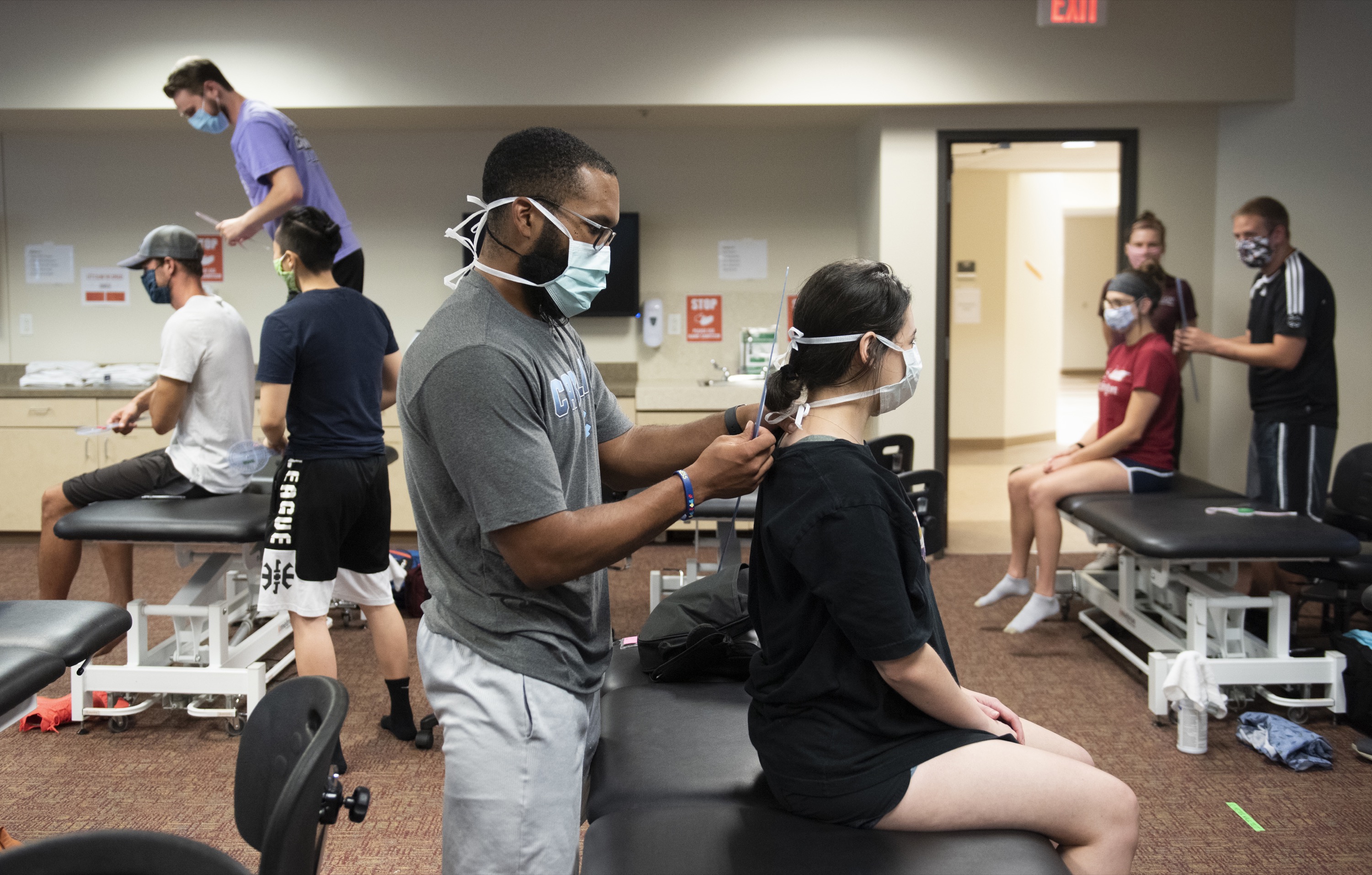Students in Elon’s School of Health Sciences experience a new classroom model as they transition to a blended learning phase pairing online with on-campus labs.
The Gerald L. Francis Center, home to the School of Health Sciences, is still relatively quiet as Elon continues to respond to the COVID-19 pandemic. Admittance to the building is restricted, and along the walls and floor is signage explaining where to walk, requesting social distancing and re-enforcing the use of masks.
But voices once again float through the building’s hallways as some students return to the Francis Center in a limited fashion.
Home to Elon’s doctor of physical therapy and physician assistant studies programs, the School of Health Sciences shifted to a new “blended learning phase” in late May. The phase put many new protocols into place to safely bring students, faculty and staff back on campus for clinical skills labs while maintaining online learning for the majority of their work.

The students are organized into isolation teams and, within those teams, in lab groups of two or three. Their labs are on a staggered schedule to keep the building’s occupancy at a minimum. Strict disinfection procedures are in place while the students are on-site, and the university’s Physical Plant team cleans the building thoroughly nightly and on weekends.
“We’re sticking to protocol and things are going really smoothly,” said Becky Neiduski, dean of the School of Health Sciences and professor of health science. “It’s exciting for us to be back in the building. Our faculty are amazing, and our students quickly adapted to a new normal in the Francis Center. It’s a lot of cleaning, but it’s worth it.”
On a recent afternoon, moving from the front entrance to the back of the building where Assistant Professor of Physical Therapy Education Melissa Scales’ midday Physical Therapy Science III lab is held, the sounds coming through the lab’s open doors are like any other traditional class. Students are asking questions, laughing and helping one another. Looking into the lab, it becomes clear that this is a unique time.
Everyone is masked, and the students are scattered throughout the large room working in their small groups. Every few minutes, one of the automatic hand sanitizer machines whirrs as it’s used, and spray bottles of disinfectant sit on every table. Per the current policy, students are practicing skills only on those in their small group, and today they’re taking turns measuring range of motion on one another. They pause intermittently to listen as Scales answers questions and guides them with new prompts.

“Having our students back is wonderful in so many ways,” Scales said. “It’s good to get back to hands-on work, and it’s so nice to see their faces and check in. Now we can look at them and say ‘How is everything going with you?’”
The School of Health Sciences continues to follow broader university guidelines in response to COVID-19, including holding all of its meetings virtually. Additionally, the students, faculty and staff are encouraged to take their temperature at the same time every day. Called temperature trending, this practice provides a baseline temperature. From the baseline, fluctuations can be noted, which allows for a quick response and a clear reason to isolate at home.
Jordan Patterson ’22, the president of the first-year Doctor of Physical Therapy class, said that he really appreciates being able to work on campus again. “Ours is not a theory-based profession. The best thing about being back is returning to hands-on learning,” he said. “That makes us the ultimate experts because we’re able to feel and to see at the same time.”
In early July, the School of Health Sciences plans to transition into a second phase that will pilot live-streamed lectures between classrooms, allow small group research activity, initiate clinical practice for ElonRUNS clients and increase access to Francis Center outside class times. Moving to that phase will be dependent on how well the current phase works as well as on recommendations from the CDC and other authorities.
“Our School of Health Sciences COVID-19 Team monitors local data every day and works together to carefully consider next steps,” Neiduski said. “The health of our students, faculty and staff is of paramount importance in every discussion.”



